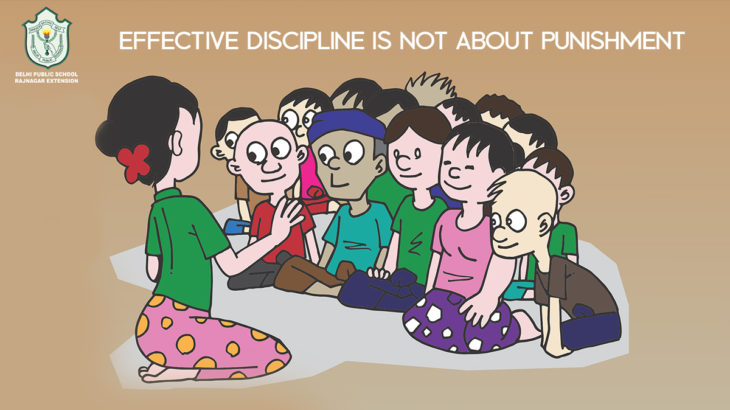The word “discipline” has its roots in the Latin word ‘disciplinare’, which means to teach or train.
Discipline is a way to guide and manage a child’s behaviour. It is based on the quality of a child’s relationship with the care provider (a teacher in the classroom, or mom and dad at home).
Consistent response from a caring adult, trust, deep attachment forms the foundation of good behaviour and effective discipline among children. We need to create a safe and loving environment for the children to discourage their negative behaviour. Many people use discipline and punishment interchangeably but, they are not synonyms. Discipline and punishment are not the same things.
Discipline is the practice of training someone to behave in accordance with rules or a code of behaviour. There is a significant difference between punishment and discipline.
Punishment gives a negative consequence, but discipline means “to teach.”
Punishment is negative and discipline is positive.
Our beliefs and attitudes shape our behaviour in whatever we do, including parenting and discipline, it is not surprising that this practice continues to be used.
I am sure many of us have experienced corporal punishment at school or at home, perhaps in the form of slapping, pinching or being humiliated. Most of us have grown up witnessing its regular use, and as a result, we have started thinking of corporal punishment as normal. We have considered it as an acceptable way to relate to the children, just because our parents and teachers used it.
However, with the change in time, we gain new knowledge and as custodians of children’s hopes and aspirations, we must accept the responsibility of creating an environment that will help children thrive. There is now a widespread understanding that corporal punishment is unlawful and harmful. It no longer has a place in the education system.
Most of us are bewildered by the child’s misbehaviour. Punishment is a popular method but it is generally ineffective. When we make the kids feel bad for what they have done and we punish them, they don’t usually feel sorry for what they did, nor do they think about how to do better next time. They usually feel angry, defensive and vengeful. It is not easy to stay calm in such situation. We should always remember that children usually don’t misbehave on purpose or just to bother you. It’s possible that they are just usually not aware of the rules, overwhelmed, tired, hungry or frustrated. In that case, a gentle approach helps them think about what they have done wrong. It does not push them to defend their actions while letting them know that we believe they are capable of setting things right!!!
As a teacher, I understood that establishing a daily routine, positive reinforcement and frequent communication is vital to develop respectful and meaningful relationships that directly affect a child’s behaviour and ability to learn.
Positive reinforcement can be shown through many gestures such as smiling, sharing a high five and giving effective praise. In the classroom, I’ve noticed that the method of effective praise is very encouraging and positive. It avoids comparisons and competition.
In addition to offer a positive reinforcement, modeling appropriate behaviour is equally important. Be mindful of what you say and how you say it, not just when you are talking to your child, but when dealing with others as well. Modeling provides visual clues to what acceptable behaviour is and indirectly reinforces the appropriate way to act.
When you guide your child, always be direct. Give reasons and explanations for rules and always make sure your directions should state what to do instead of what not to do.
These techniques are very effective which can be tried at home also but, keep in mind that behaviour doesn’t change overnight. Teachers work with the children on a daily basis and still, discipline is something that takes us years of studying, practicing and reflecting to get a handle on.
As parents, it can be a lot more difficult. Give yourself a lot of grace. Get support, allow your partner, family, and friends to pitch in and always remember to take time out to recharge your batteries.
~ Bhavana Tewari

